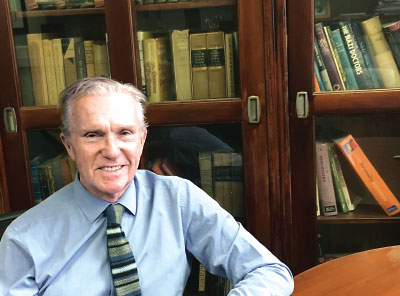‘None of Us Is Immune’: Session Focuses on Physician Suicidality
Abstract
Speakers will delve into the most recent research and data around physician suicidality, discuss how psychiatrists should approach treating a fellow physician as a patient, and share personal experiences.
When Michael Myers, M.D., talks about suicidality among physicians, he adamantly reinforces one fact: It can happen to anyone.
“None of us is immune,” said Myers, a professor of clinical psychiatry in the Department of Psychiatry and Behavioral Sciences at SUNY-Downstate Health Sciences University. “Suicide prevention is everyone’s business.”

Michael Myers, M.D., hopes that his session will not only provide attendees with new information but also reinforce the good practices they already utilize.
Myers will lead the session titled “The Suicidal Physician: Narratives From a Physician Who Survived and the Physician Widow of One Who Did Not.” A specialist in physician health, Myers has published numerous books on the subject, including Becoming a Doctors’ Doctor: A Memoir and Touched by Suicide: Hope and Healing After Loss.
Myers’ presentation will delve into how psychiatrists should approach treating a fellow physician and what they should be aware of. “One of the most important things to remember is that the person opposite you is a suffering human being who just happens to be a physician,” he said.
He will be joined during the session by two physicians with personal knowledge of a physician suicide. William Lynes, M.D., a retired urologist, will describe how he struggled with depression and made several suicide attempts before receiving life-saving care. Myers pointed out that Lynes’ story exemplifies what many physicians experience: He avoided psychiatric care at first and dealt with severe shame. “I’m always making the point that, as psychiatrists, we need to do more to make ourselves available to our colleagues in need,” Myers said.
Linda Wrede-Seaman, M.D., is a primary care and palliative care physician who will also share her experience. Wrede-Seaman’s husband, also a physician, died by suicide, and she will discuss how she and her husband struggled to get him adequate psychiatric care and how they dealt with “insults and assaults” from the medical licensing board and from the legal system as they worked through a lawsuit.
When psychiatrists treat fellow physicians, they must remember that these patients are too often overcoming enormous stigma in seeking psychiatric care, Myers explained. “They’re terrified of seeing the psychiatrist, and they’re beating themselves up because they feel flawed, ashamed, less than, and diminished,” he said. Additionally, fear of losing their medical license or hospital admitting privileges may also deter them from seeking care.
“We should know what to watch out for in our doctor colleagues,” Myers said. “By reaching out, you can save a life.” ■
“The Suicidal Physician: Narratives From a Physician Who Survived and the Physician Widow of One Who Did Not” will be held Saturday, May 1, from 4 p.m. to 5:30 p.m.



